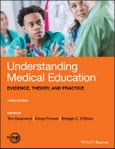Created in partnership with the Association for the Study of Medical Education (ASME), this completely revised and updated new edition of Understanding Medical Education synthesizes the latest knowledge, evidence and best practice across the continuum of medical education.
Written and edited by an international team, this latest edition continues to cover a wide range of subject matter within five broad areas - Foundations, Teaching and Learning, Assessment and Selection, Research and Evaluation, and Faculty and Learners - as well as featuring a wealth of new material, including new chapters on the science of learning, knowledge synthesis, and learner support and well-being.
The third edition of Understanding Medical Education:
- Provides a comprehensive and authoritative resource summarizing the theoretical and academic bases to modern medical education practice
- Meets the needs of all newcomers to medical education whether undergraduate or postgraduate, including those studying at certificate, diploma or masters level
- Offers a global perspective on medical education from leading experts from across the world
Providing practical guidance and exploring medical education in all its diversity, Understanding Medical Education continues to be an essential resource for both established educators and all those new to the field.
Table of Contents
Contributors, vii
Foreword to the Third Edition, xiii
Preface, xv
Part 1: Foundations, 1
1 Understanding Medical Education, 3
Tim Swanwick
2 A Global View of Structures and Trends in Medical Education, 7
Bridget C. O’Brien, Kirsty Forrest, Marjo Wijnen‐Meijer, and Olle ten Cate
3 The Science of Learning, 23
Anique B. H. de Bruin, Matthew Sibbald, and Sandra Monteiro
4 Teaching and Learning in Medical Education: How Theory can Inform Practice, 37
David M. Kaufman
5 Principles of Curriculum Design, 71
Janet Grant
6 Instructional Design: Applying Theory to Teaching Practice, 89
Linda Snell, Daisuke Son, and Hirotaka Onishi
7 Quality in Medical Education, 101
Diane N. Kenwright and Tim Wilkinson
Part 2: Teaching and Learning, 111
8 Lectures and Large Groups, 113
Dujeepa D. Samarasekera, Matthew C. E. Gwee, Andrew Long, and Bridget Lock
9 Learning in Small Groups, 123
Peter McCrorie
10 Technology‐enhanced Learning, 139
Rachel H. Ellaway
11 Simulation in Medical Education, 151
Alexis Battista and Debra Nestel
12 Work‐based Learning, 163
Clare Morris
13 Supervision, Mentoring, and Coaching, 179
John Launer
14 Interprofessional Education, 191
Della Freeth, Maggi Savin‐Baden, and Jill Thistlethwaite
15 Patient Involvement in Medical Education, 207
John Spencer, Judy McKimm, and Jools Symons
16 Learning Medicine With, From, and Through the Humanities, 223
Neville Chiavaroli, Chien‐Da Huang, and Lynn Monrouxe
17 The Development of Professional Identity, 239
Sylvia R. Cruess and Richard L. Cruess
18 Portfolios in Personal and Professional Development, 255
Erik Driessen and Jan van Tartwijk
19 Continuing Professional Development, 263
Simon Kitto, David Price, Dahn Jeong, Craig Campbell, and Scott Reeves
Part 3: Assessment and Selection, 275
20 How to Design a Useful Test: The Principles of Assessment, 277
Lambert W. T. Schuwirth and Cees P. M. van der Vleuten
21 Written Assessment, 291
Brian Jolly and Mary Jane Dalton
22 Workplace Assessment, 319
John J. Norcini and Zareen Zaidi
23 Structured Assessments of Clinical Competence, 335
Katharine A. M. Boursicot, Trudie E. Roberts, and William P. Burdick
24 Standard Setting Methods in Medical Education: High‐stakes Assessment, 347
André F. De Champlain
25 Formative Assessment: Assessment for Learning, 361
Diana F. Wood
26 Selection into Medical Education and Training, 375
Fiona Patterson, Eamonn Ferguson, and Lara Zibarras
Part 4: Research and Evaluation, 389
27 Philosophical Research Perspectives and Planning your Research, 391
Jan Illing and Madeline Carter
28 Quantitative Research Methods in Medical Education, 405
Geoff Norman and Kevin W. Eva
29 Qualitative Research in Medical Education: Methodologies and Methods, 427
Stella L. Ng, Lindsay Baker, Sayra Cristancho, Tara J. Kennedy, and Lorelei Lingard
30 Programme Evaluation, 443
Chris Lovato and Linda Peterson
31 Knowledge Synthesis, 457
auren A. Maggio, Aliki Thomas, and Steven J. Durning
Part 5: Faculty and Learners, 471
32 Career Progression and Support, 473
Caroline Elton and Nicole J. Borges
33 Supporting Learner Well‐being, 485
Jo Bishop, Graeme Horton, Wendy Hu, and Claire Vogan
34 Managing Remediation, 497
Deborah Cohen, Melody Rhydderch, and Ian Cooper
35 Diversity in Medical Education, 513
Nisha Dogra and Olivia Carter‐Pokras
36 Developing Medical Educators: A Journey, not a Destination, 531
Yvonne Steinert
37 Educational Leadership and Management, 549
Judy McKimm and Tim Swanwick
Index, 569








